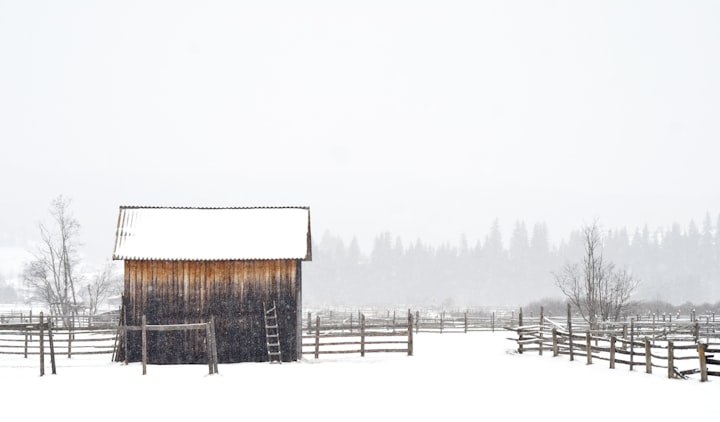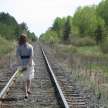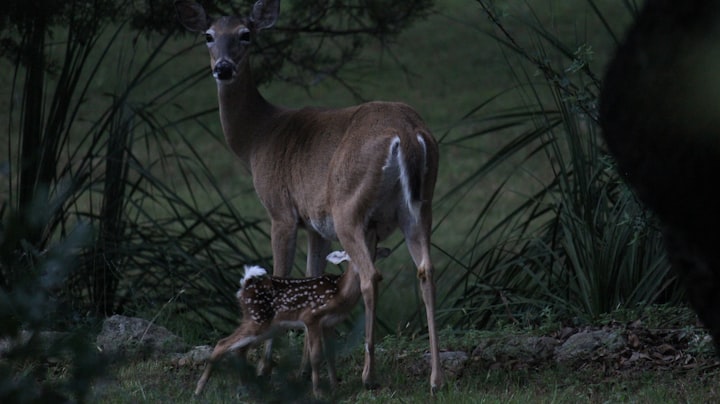A Wake in Winter
A girl grieves in the hayloft.

It was cold, unmercifully windy, and Wren wasn’t wearing the right kind of coat to combat the weather, but outside was preferable to inside. Inside was warm and stuffy with twenty-five people crammed into the too-small house, all with red eyes, giving hugs every time she turned around, and talking in low voices. The candles dimly lit the living room filled with chairs and the smell of many casseroles hung heavy in the air. There wasn’t a single place to be alone that didn’t reek of too much sympathy and over-warmed pot roast.
It felt good to be too cold; it felt right that the wind should lash her long hair into her face, stinging and bitter. Was that snow or a bit of sleet? She put her head down and walked down the long lane of the farm. It wound past the machine shed with the tractors, over the creek, and up to the animal barns.
She wasn’t sure where she was going until she was there. The cattle that had taken refuge from the weather in the barn looked up at her as she climbed over the gate. One lowed softly. She could hear them rhythmically chewing their cud as they stood or lay in the straw she had spread there with her father just days before. Something so simple as straw on the ground made her eyes sting and her heart misfire.
The ladder to the loft was just past the paneled walls, walls that still had a couple of heavy iron rings in them from the days when this barn housed hogs. The rings kept them from rooting into the walls—nearly 70 years ago. She put a hand on the study ladder and started to climb, even as the wind howled outside. The light got dimmer and dimmer as she climbed, but the dark was comforting and the air was still.
As she came out of the hole in the loft floor from the ladder, she had to duck under a railing, designed to help you see the hole when the loft was filled with hay and straw bales. Looped over the railing were many lengths of baling twine from used bales. Her father always put it there, neatly organized, so that they wouldn’t get lost on the floor and he would have one when he needed it. There was the pitchfork, right where he had left it against the paneling.
She felt strangled; desperate for something to do. She grabbed the push broom and started sweeping loose hay and straw off the main floor; the stuff was slippery and you either needed the floor clear of it, or you needed three inches of it. But it was pointless—her father had done it his last day in the loft. He was everywhere.
A soft mew from above made her look up; through blurry eyes she could see Sam, one of the barn cats, making biscuits on a bale above her. Dropping the broom, she climbed up to join him. The hay was warm, and Sam was delighted to find an even warmer lap to sit in. As he pranced on Wren’s thighs, the tears that had been constricting her words since her father’s last hour finally came. They came in wracking sobs, drowning out the howling wind. Sam was concerned and butted his head against her chin and licked her cheeks, claws picking and kneading her jacket. She tucked him into her arms, laid on her side among the bales and let the storm of emotions wash over her. Tears and mucus and giggles at Sam’s rough tongue all collided. She cried into the dried alfalfa leaves, flowers, and grass of the bales; Sam purred under her chin. She cried for what she had lost, and what the future would be missing. She cried for a father too soon gone, and for his friendship and teaching brought to an end. She cried in frustration at the family who wouldn’t let her grieve alone, and cried because she felt so very lonely.
When her sobs had turned into hiccups, she finally started wishing for a tissue. Her pockets were empty so she used her sleeves. Sam’s fur was all over the front of her jacket; hay and straw, still smelling warmly of summer, were stuck to the back and in her hair. “I'm a disaster,” she told Sam. He just looked at her and purred, eyes luminous even in the dim light. “I guess I should go back, huh? And see Dad?” Sam’s claws picked a thread out of her jeans and then he hopped off to see about a mouse.
Wren climbed back down the ladder into the grey, windy, light feeling…empty. A better sort of empty—like a potato she had been trying to swallow finally went down; like she could breathe again. She was cold going back ot the house, and found that she was looking forward to the warmth and maybe even a bite of pot roast.
No one had missed her—or maybe they had. An aunt picked a couple of pieces of hay from Wren’s hair and wiped her cheeks with a sort of knowing look in her eyes. Wren suddenly suspected that someone had seen her go and had been watching for her out the window.
“We’re sharing stories about your father, and were just about to sing some of his favorite songs,” her aunt said. “Want to join us?” It wasn’t a command—just a gentle invitation. Wren thought she was going to say no, but a whiff of sweet hay drifted down from her hair and she suddenly felt the courage.
“Yes,” she told her aunt, taking her hand. “I’d like that,” and together, they walked into the crowded living room and Wren’s father’s wake.
About the Creator
Lydia Stewart
Lydia is a freelance copywriter and playwright, watercolorist and gardener living in Michigan. She loves to collaborate with writer friends, one of whom she married. Her inspirations come from all of these interests and relationships.






Comments
There are no comments for this story
Be the first to respond and start the conversation.